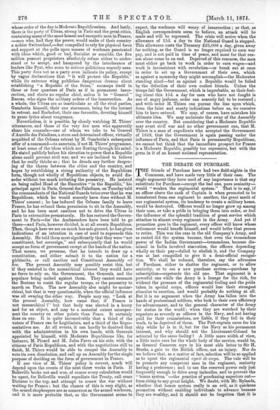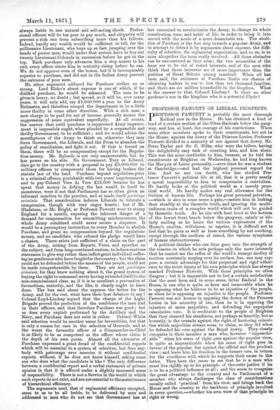THE DEBATE ON PURCHASE.
THE friends of Purchase have had two field-nights in the Commons, and have made very little of their case. The single argument they have used of any importance is that any substitute for Purchase—except the bad one, pare seniority— would "weaken the regimental system." That is to say, if an officer above the rank of Captain is when promoted to be transferred from one regiment to another, the great merit of our regimental system, its tendency to create a military home, would be destroyed. Officers would no longer grow up among their men, or take a pride in bringing them into order, or feel the influence of the splendid tradition of great service which attaches to almost every regiment in the Army. And yet if promotion goes in the regiment, every officer will know whose retirement would benefit himself, and would bribe that person to retire. This was the case in the old Company's Army, and so rooted did the system become, that even the tremendous power of the Indian Government—tremendous, because dis- missal in India involved starvation, the officers depending wholly on their pay—failed to abolish it, and the Company was at last compelled to give it a demi-official recogni- tion. We shall be reduced, therefore, say the advocates of Purchase, either to shatter the regiment, or to allow seniority, or to see a new purchase system—purchase by subscription—supersede the old one. That argument is a powerful one while the Army is a lounge for the rich, for without the pressure of the regimental feeling and the pride taken in special corps, officers would lose their strongest stimulus to exertion, and would probably do nothing at all. But it is no argument when the Army has fallen into the hands of professional soldiers, who look to their own efficiency for advancement, and to the general character of the Army for status in the world ; when they are watched by their superiors as severely as officers in the Navy, and not having paid for their commissions, are liable, if they fail in their work, to be deprived of them. The Post-captain cares for his ship while he is in it, but for the Navy as his permanent interest, and why should not the Lieutenant-Colonel be actuated by the same feeling ? A little more width of view, a little more care for the whole body of the service, would be, as General Cameron says in his most able letter to Sir H. Storks, a gain to the British officer, not an injury. Nor do we believe that, as a matter of fact, selection will be so applied as to upset the regimental esprit de amps. The rule will be to promote any competent man in the regiment, seniority having a preference ; and to use the reserved power only just frequently enough to drive away imbeciles, and to prevent the "bonus system "—the practice of purchasing superiors out— from rising to any great height. We doubt, with Mr. Rylands, whether that bonus system really is an evil, as it quickens promotion without enabling individuals to advance because they are wealthy, and it should not be forgotten that it is
always liable to one natural aid self-acting check. Profes- sional officers will be too poor to pay much, and etiquette will prevent a rich one from subscribing more than his fellows. Indeed, hardly any wealth would be sufficient to tell, for the millionaire Lieutenant, who buys up so fast, jumping over the heads of poorer men, would under that system have to buy out twenty Lieutenant-Colonels in succession before he got to the top. Each purchase only advances him a step nearer to his end, every officer above him in seniority rising before he can. We do not approve even of the bonus, but it is incomparably superior to purchase, and did not in the Indian Army prevent the entrance of poor men.
No other argument adduced for Purchase strikes us as strong. Lord Elcho's about expense is one of which, if he disliked purchase, he would be ashamed. The sum to be given is heavy, no doubt ; but spread, as it will be, over many years, it will only add, say £1,000,000 a year to the Army Estimates, and therefore compel the department to be a little more thrifty in some other direction. With a rich man, a new charge to be paid for out of income generally means the suppression of some equivalent superfluity. At all events, the answer that until purchase is suppressed Army improve- ment is impossible ought, when pleaded by a responsible and thrifty Government, to be sufficient ; and we would advise the mouthpieces of the Army to think so, otherwise they may force Government, the Liberals, and the Press to abandon the policy of conciliation, and fight it out. If that is forced on them, there will be no compensation except for the Regula- tion-money. Mr. Rylands is not only unanswerable, but he has power on his side. No Government, Tory or Liberal, dare go to the country with a proposal to pay £3,000,000 to military officers to compensate them for having broken the statute law of the land. Purchase beyond regulation-price is a criminal offence, pimishable with two years' imprisonment, and to pay Colonel Vera de Vere .£12,000 because he has spent that money in defying the law would in itself be monstrous, were it not that Parliament has so often given an informal sanction to the practice, and so made itself particeps crirninis. That consideration induces Liberals to tolerate a compromise, though with very angry hearts ; but if Mr. Gladstone, or Mr. Bright, or Professor Fawcett were to stump England for a month, exposing the inherent danger of a demand for compensation for committing misdemeanour, the whole Army combined could never secure a sixpence. It would be a peremptory instruction to every Member to abolish Purchase, and grant no compensation beyond the regulation- money, and no candidate who refused the pledge would have a chance. There exists just sufficient of a claim on the part of the Army, arising from Reports, Votes, and speeches on the subject, and from long-continued custom, to induce cautious statesmen to give way rather than inflict great individual suffer- ing on gentlemen who have foughtfor the country; but the claim could not be defended before the masses of the people, could not be made comprehensible by them. They are not participes criminis, for they know nothing about it, the grand system of buying the right to command never having extended itself to the non-commissioned class, as, if it is so excellent a preventive of favouritism, seniority, and the like, it clearly ought to have done. The less said about the expense the better for the Army, and for the rest, what have their best debaters to say? Colonel Loyd-Lindsay argued that the charge of the Light Brigade proved the perfection of the confidence the men had in their officers, and that therefore Purchase was good ; but so does every exploit performed by the Artillery and the Navy, and Purchase does not exist in either. Colonel White said selection would be another name for favouritism, but that is only a reason for care in the selection of Generals, and at the worst the favourite officer of a Commander-in-Chief is as likely to be as competent as the officer whose claim is the depth of his own purse. Almost all the advocates of Purchase expressed a great dread of the confidential reports which will be essential to a system of selection, but does any- body with patronage ever exercise it without confidential reports, without, if he does not know himself, asking some one who does what the candidate is like? The only difference between a confidential report and a verbal statement of private opinion is, that it is offered under a slightly increased sense of responsibility. There is not a Service in the world in which such reports do not exist, and are not essential to the maintenance of hierarchical efficiency.
The arguments used, that of regimental efficiency excepted, seem to us to be all feeble, to be delivered by men and addressed to men who do not see that Government has at
last consented to revolutionize the Army, to change its whole constitution, tone, and habit of life, in order to bring it into accord with the needs of a more democratic era. The aboli- tion of Purchase is the first step towards a popular Army, and to attempt to defend it by arguments about expense, the diffi- culty of selection, the regimental organization, and so on, is to miss altogether the issue really involved. All those obstacles can be encountered as they arise ; the two necessities of the hour are to be rid of vested interests, and of the men who think that those interests are of more importance than the position of Great Britain among mankind. When all has been said, the existence of Purchase limits our chance of obtaining leaders in war to less than ten thousand families, and there are six million households in the kingdom. What is the answer to that, Colonel Lindsay ? Is there no other gardener's son in the kingdom who is a potential Clyde ?



































 Previous page
Previous page